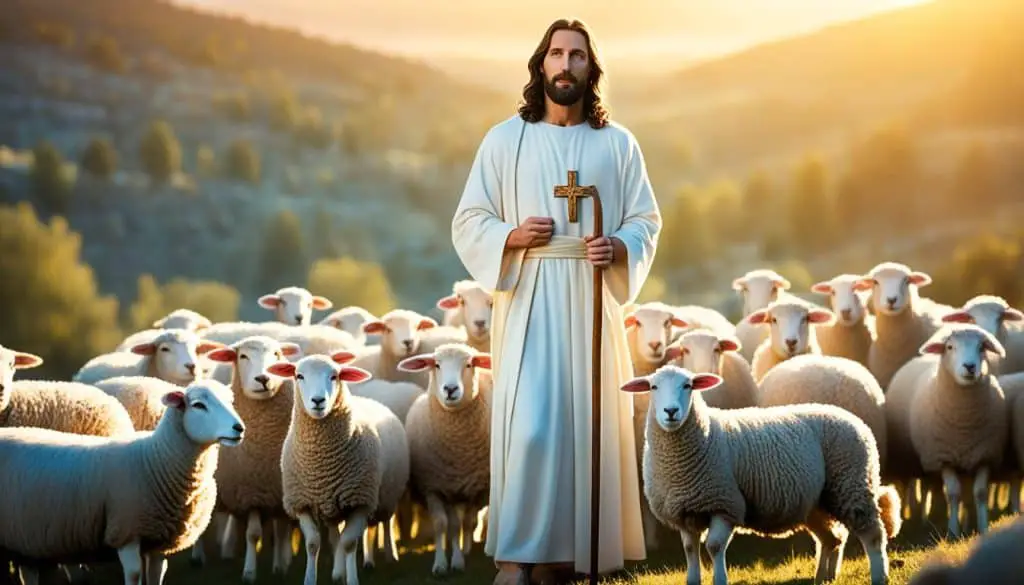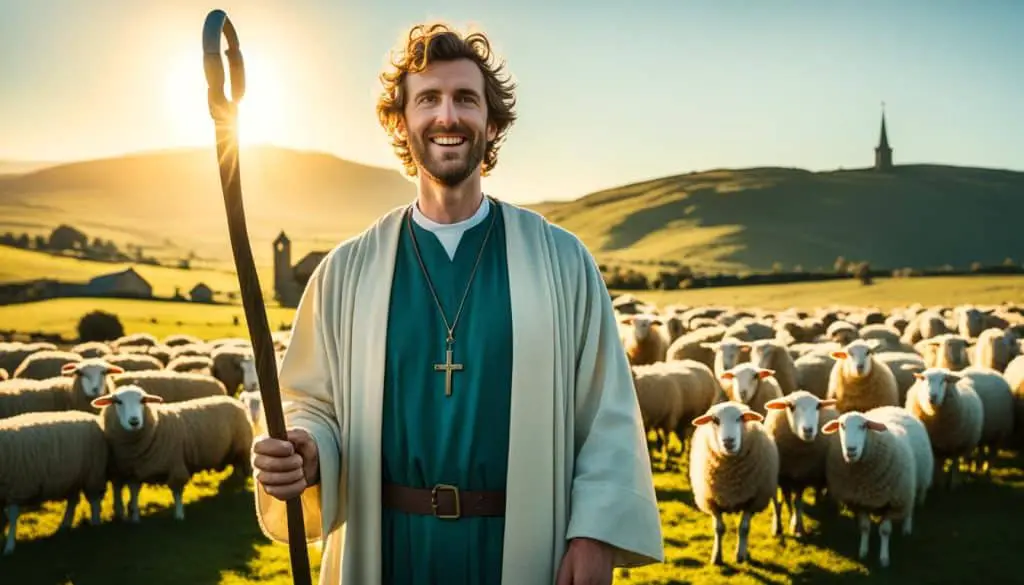Table of Contents
Ever thought about how important animal herders are in the Bible? They have played key roles from Abel to Jesus. These people have taught us about leadership, sacrifice, and following God’s will. So, who exactly were these herders? How did they shape our faith and history?
Let’s explore their stories. By doing so, we can learn the deep lessons they have for us today.
Abel: The First Shepherd
Abel is known as the first shepherd in the Bible. In Genesis 4:2, we see that he took care of sheep while his brother Cain farmed the land.
Abel showed his faith by giving the best of his flock to God. God was pleased with his offering, unlike Cain’s. This showed how Abel believed in offering his best to the Divine.
Being the first shepherd, Abel set an example for future shepherds. His dedication and faith are remembered. His story inspires shepherds throughout history.
“Abel’s offering of the firstlings of his flock showcased his devotion as a shepherd and his understanding of giving his best to God.”
Shepherds have always had a major role in the Bible. Abel’s story is where it all begins. The image just below shows how Abel might have led his flock.
This image gives us an idea of the peaceful life of a shepherd. It also reminds us of the key role shepherds have played throughout history and in today’s world.
Jacob: The Shepherd-Grandson
In the Bible, Jacob, Abraham’s grandson, stood out as a shepherd. He met shepherds near a well in Genesis 29:3-9, after reaching his relatives’ land.
“Jacob asked, ‘Where are you from, my brothers?'” They said, ‘We’re from Harran.’
He then asked, ‘Do you know Laban, Nahor’s grandson?’ ‘Yes, we do,’ they replied.
“Is he doing well?’ Jacob asked. ‘Yes, he is,’ they said, ‘Look, his daughter Rachel is coming with the sheep.’
Jacob showed real care for Laban by asking about him. His concern reveals the true heart of a shepherd – caring for others deeply.
The image highlights Jacob’s shepherd nature, caring for his flock diligently. Just like protecting the sheep, he looked after their safety and food.
“Laban told Jacob, ‘I could really hurt you for this. But, the God of your father warned me last night. He said not to harm you in any way.’ “
Even facing danger from Laban, Jacob didn’t waver in safeguarding the flock. This shows his rock-solid commitment as a shepherd.
Jacob’s Legacy as a Shepherd
Being a shepherd greatly influenced Jacob’s life and leadership. It taught him to take care of others and deal with tough times.
Next, we’ll look at how Moses changed from a shepherd to a great leader. Stay tuned to learn about this shepherd’s remarkable journey.
Moses: The Shepherd-Leader
Before leading the Israelites out of Egypt, Moses was a shepherd. He looked after Jethro’s sheep in the wild (Exodus 3:1). This job shaped him for his later role as a leader.
Being a shepherd, Moses guarded and led his flock. He took responsibility for their safety and well-being. This taught him how to protect and guide others, skills essential for his future as a leader.
“And Moses said unto the Lord, ‘Who am I, that I should go unto Pharaoh, and that I should bring forth the children of Israel out of Egypt?'”
“And he said, ‘Certainly I will be with thee; and this shall be a token unto thee, that I have sent thee: When thou hast brought forth the people out of Egypt, ye shall serve God upon this mountain.'”
(Exodus 3:11, 12)
His time as a shepherd not only prepared him for leadership but also shaped his character. Moses learned how to be patient and compassionate, which are important leadership virtues. His time in the wilderness also taught him to be resilient and resourceful, great qualities for facing Pharaoh.

Lessons from Moses’s Shepherd-Leadership
Moses’s shift from a shepherd to a leader shows us key leadership qualities. These include humility, patience, and selflessness, which are essential for guiding others.
- Humility: Moses’s self-doubt shows he knew his limits. True leaders understand their weaknesses and seek help.
- Patience: His shepherd days taught him to wait. This skill helped him lead the Israelites over many years in the wilderness. A good leader knows when patience is necessary.
- Selflessness: Moses put his flock first, showing leaders should care for their followers above themselves.
We can still learn from Moses’s shepherd-to-leader journey. It tells us that real leadership demands humility, patience, and a focus on others’ needs. These teachings are relevant in various leadership roles, including today’s corporate world.
David: The Shepherd-King
In biblical history, David shines as both a brave shepherd and a strong ruler. He journeyed from caring for his father’s sheep to leading Israel. This transition highlights his skills in leadership, courage, and deep faith.
David’s early days as a shepherd were full of peril in the wild. He boldly defended his father’s flock against lions and bears. This act showed he had great courage in the face of danger (1 Samuel 17:34-36).
“The Lord saved me from a lion and a bear. He will save me from this Philistine,” David boldly said.
His bravery and firm trust in God’s safety hinted at the king he would become. Leaving a simple life as a shepherd, David was chosen to be Israel’s king (1 Samuel 16:11-13).
David easily moved from shepherd to king, thanks to his shepherding skills. Like a shepherd with his flock, he guided and safeguarded his people. He showed wisdom, honesty, and a strong faith in God as a leader.
“The Lord is my shepherd; I lack nothing,” David penned famously in Psalm 23, showing his belief in God’s care.
David’s strong faith, seen in his roles as shepherd and king, made him dear to God. He’s remembered as a model of faith, courage, and leadership. His story has inspired many over the years to trust in God.
Amos: The Humble Shepherd-Prophet

Amos came from simple beginnings, working as a shepherd and caring for sycamore trees. He wasn’t born royal. Yet, God chose him to be a prophet. This shows that God’s call can reach anyone, regardless of their background.
“I was no prophet, nor a prophet’s son, but I was a shepherd and a dresser of sycamore trees.” – Amos 7:14
His job as a shepherd helped him understand the role of a prophet. Just like tending to sheep, guiding God’s people requires care and dedication. Amos learned a lot about looking after others through his work.
Amos teaches us that where we come from doesn’t limit what we can do for God. His life inspires those who start from modest places. He shows them they can make a big difference.
The Calling of Amos
In Amos 7:14-15, we see God called Amos from his shepherding:
Then Amos answered and said to Amaziah, “I was no prophet, nor a prophet’s son, but I was a shepherd and a dresser of sycamore trees, and the LORD took me from following the flock, and the LORD said to me, ‘Go, prophesy to my people Israel.'”
He wasn’t trained to be a prophet. God chose him from his simple life. This was to speak to the people of Israel. Amos’ story shows God can work through anyone, no matter their background or social standing.
This story underlines the value of humility. It shows us that being open to God’s call is what matters most. Even in our everyday lives, God can choose us to do great things.
| Amos: The Humble Shepherd-Prophet | |
|---|---|
| Keywords | Amos, Amos 7:14, shepherd, prophet, humble background |
| Main Points |
|
Micah: The Shepherd-Ruler
Micah stands out among the prophets for his view on a shepherd as a leader. In Micah 5:4-5, he describes a leader from Bethlehem. This leader will be a shepherd not just to Israel but to all people.
Micah shows us a shepherd-ruler who leads with fairness and brings peace. He uses the shepherd image to show this ruler’s caring and protective side. It highlights the leader’s compassion and wisdom.
This prophecy by Micah is very important in both belief and history. It predicts the birth of Jesus, born in Bethlehem (Matthew 2:1). Jesus later called himself the Good Shepherd (John 10:11).
This shepherd-ruler is not like other leaders. They put people’s needs first. They bring justice, peace, and ensure everyone is safe and happy.
“He shall stand and shepherd His flock in the strength of the Lord, in the majesty of the name of the Lord His God. And they shall dwell secure, for now He shall be great to the ends of the earth.”
Micah 5:4
Micah 5:4’s words show the power and importance of this shepherd-ruler. They promise peace and safety for everyone. These words bring hope of a fair and kind leader.
The shepherd-ruler in Micah’s prophecy is crucial for understanding God’s plan. This leader, born in Bethlehem, shows how deeply God loves and cares for His people. He brings love, justice, and peace to everyone.
The Shepherd-Ruler in Micah
| Aspects | Description |
|---|---|
| Fulfillment of Prophecy | The shepherd-ruler fulfills Micah’s prophecy about a future leader who will come from Bethlehem. |
| Leadership with Justice | The shepherd-ruler leads with fairness and ensures justice, looking out for everyone’s well-being. |
| Establishment of Peace | The shepherd-ruler brings peace, making the world harmonious and safe for all. |
| Fulfillment in Jesus | Jesus, born in Bethlehem, is the ultimate shepherd-ruler, with authority, love, and compassion. |
Micah’s prophecy helps us understand the shepherd-ruler’s nature and how Jesus fulfilled it. As followers, we aim to reflect the shepherd-ruler’s values, seeking justice, peace, and leading with compassion in our lives.

Jesus: The Good Shepherd
In the New Testament, Jesus often calls himself the good shepherd In John 10:11-14, he explains his job. He shows how much he loves and cares for his followers. Jesus is ready to give up his life for them, proving his deep devotion to their safety.
Jesus says he is the good shepherd to show his love and care. He looks after his followers like a shepherd watches over his sheep. This shows his selflessness and sacrifice, important parts of the shepherd’s role in the Bible.
Jesus’s Love and Care for His Sheep
“I am the good shepherd. The good shepherd lays down his life for the sheep. He who is a hired hand and not a shepherd, who does not own the sheep, sees the wolf coming and leaves the sheep and flees, and the wolf snatches them and scatters them. He flees because he is a hired hand and cares nothing for the sheep. I am the good shepherd. I know my own and my own know me, just as the Father knows me and I know the Father; and I lay down my life for the sheep.” – John 10:11-14
Jesus speaks about the close bond he has with his followers. He and his followers truly know each other. This is like the close relationship between a shepherd and his sheep. His love and care reach every follower. No one is forgotten or left behind.
As their good shepherd, Jesus guides with compassion and wisdom. He takes care of his followers’ needs and leads them to a life of fulfillment. Like a shepherd who knows each sheep, Jesus knows each person well. He offers guidance and support at every turn.
Seeing Jesus as the good shepherd gives believers a deep sense of security and trust in his unfailing love. It inspires people to look after each other with the same selflessness. Jesus as the good shepherd is timeless. His teachings lead us to follow his example closely.

Peter: The Shepherd-Leader of the Early Church
After being resurrected, Jesus gives Peter a special task in John 21:15-17. He tells Peter to look after his followers. This shows Peter’s leadership in the early church, guiding and caring for believers spiritually.
“When they had finished breakfast, Jesus said to Simon Peter, ‘Simon, son of John, do you love me more than these?’ He said to him, ‘Yes, Lord; you know that I love you.’ He said to him, ‘Feed my lambs.’ He said to him a second time, ‘Simon, son of John, do you love me?’ He said to him, ‘Yes, Lord; you know that I love you.’ He said to him, ‘Tend my sheep.’ He said to him the third time, ‘Simon, son of John, do you love me?’ Peter was grieved because he said to him the third time, ‘Do you love me?’ and he said to him, ‘Lord, you know everything; you know that I love you.’ Jesus said to him, ‘Feed my sheep.'”
First called Simon, Peter was one of Jesus’ twelve closest followers. He was already a standout among the disciples before Jesus’ death. Peter showed strong faith and often spoke for the group.
Despite his early role, Peter faced tough times. He famously denied knowing Jesus three times before the crucifixion. Yet, Jesus forgave and restored him. After that, Peter grew to lead the early church powerfully.
In the book of Acts, Peter’s words and his leadership were key to growing the Christian movement. He shared Jesus’ message without fear, worked miracles, and helped many believe.
The Role of Peter in the Early Church
Peter was crucial not only in preaching but also in setting up the early church’s structure. In Acts, he makes big decisions and leads the believers in important actions.
He was known for being bold, true to his beliefs, and deeply loving Jesus. Peter became a connection between Jewish and non-Jewish followers. His role was critical in the decision in Jerusalem about church customs.
In that decision, Peter guided others on whether non-Jewish followers should follow Jewish laws. He helped decide that following Jesus’ teachings was most important.
The Legacy of Peter
Peter’s work as a shepherd-leader deeply impacted Christianity’s early growth. His firm trust in Jesus and his brave sharing of the gospel inspired many then and now.
He is recognized as a major figure in the early church and the first pope by the Catholic Church. Peter’s lessons and writings still encourage Christians around the world.
A Visual Representation of Peter’s Leadership

| Characteristics | Leadership Lessons from Peter |
|---|---|
| 1. Courage | Teaches us to stand firm in our beliefs, like Peter did against opposition. |
| 2. Humility | Shows us to be humble and willing to learn, from Peter’s own stories of growth. |
| 3. Love for Christ | Highlights the crucial role of a strong personal relationship with Christ in leading others well. |
| 4. Shepherd’s Heart | Challenges us to care for the spiritual lives of our followers, just as Peter did. |
| 5. Forgiveness and Restoration | Peter’s personal journey teaches the power of redemption and the need to forgive. |
Reflecting on Peter’s life and leadership, we are encouraged to lead like him. As shepherd-leaders, we can guide and care for those around us, both in our communities and churches.
The Enduring Impact of Animal Herders
Animal herders in the Bible taught us about being leaders, making sacrifices, and caring for others. Much of what we know about leadership and love comes from them.
They moved a lot and were very close to nature. This gave them a special wisdom. Their care for their flocks teaches us how to treat each other and understand spirituality.
“A good shepherd lays down his life for the sheep.” – JOHN 10:11
The Bible holds animal herders in high regard. Their faith and hard work show us what good leaders do. They guide and protect just like good shepherds do for their sheep.
Herders also taught us to care and be kind. They showed us how to think about others before ourselves. This is a big lesson in what true faith and love really means.
The Impact on History
Animal herders didn’t just help us spiritually. They also changed history. Figures from the Bible like Abel and Jesus led lives that showed us the power of faith.
Their stories spread beyond one culture. They helped create a world where people care for each other and seek justice.
Biblical Significance
Animal herders played a crucial role in the Bible. They remind us of our duty to care for God’s Earth. It’s a reminder of the bond between us and the natural world.
Their stories also remind us that anyone can share God’s message. Amos, a shepherd, became a prophet. It shows that from any background, we can do great things for God.

| Animal Herder | Biblical Significance |
|---|---|
| Abel | First shepherd, pleasing offering to God (Genesis 4:2-4) |
| Jacob | Shepherd-grandson, responsibility for the well-being of the flock (Genesis 29:3-9) |
| Moses | Shepherd-leader, preparation for leading the Israelites (Exodus 3:1) |
| David | Shepherd-king, courage and leadership (1 Samuel 16:11-13) |
| Amos | Shepherd-prophet, God’s use of humble backgrounds (Amos 7:14-15) |
| Micah | Shepherd-ruler, future ruler from Bethlehem (Micah 5:4-5) |
| Jesus | Good shepherd, love and care for His followers (John 10:11-14) |
| Peter | Shepherd-leader of the early church (John 21:15-17) |
The Universal Message of Animal Herders
The Bible includes stories of animal herders to show a variety of people God uses. They teach us about faith, leadership, and responding to God’s calling.
From the Bible, we learn about these animal herders with important roles. Their stories show us about faith in God and caring for others. They include Abel, the first shepherd, and Jesus, known as the Good Shepherd.
“And Abel, he also brought of the firstlings of his flock and of the fat thereof. And the Lord had respect unto Abel and to his offering” (Genesis 4:4).
These individuals weren’t always from high classes, but they were vital in God’s plan. They took care of their flocks and were deeply connected to their spiritual purpose.
The Bible tells us how valuable diversity is. It shows that anyone can be called by God, no matter their job, social rank, or qualifications.
Lessons in Faith and Leadership
Animal herders’ stories aren’t just historical. They teach us key lessons for today. They highlight the importance of caring for others and leading with integrity.
- They show us that even simple jobs can be very important.
- True leadership means putting others first and protecting them.
- We should welcome all kinds of people, seeing God’s work in everyone’s life.
These stories remind us that our impact can be great, no matter our situation. We should lead and serve where we are, trusting that it matters deeply.

The Universal Call to Follow God
The animal herders’ stories encourage us to respond to God’s call, no matter who we are. They remind us that serving God is for everyone, from different backgrounds and jobs.
We all have an important part in God’s plan. The tales of these animal herders help us see this, urging us to trust God’s lead and follow faithfully.
| Biblical Animal Herders | Lessons Learned |
|---|---|
| Abel | The importance of offering our best to God |
| Jacob | The responsibility of caring for those entrusted to us |
| Moses | The role of leadership in guiding and protecting God’s people |
| David | The courage to face challenges and protect those under our care |
| Amos | The value of humility and the unexpected roles God may call us to |
| Micah | The promise of righteous and just leadership to shepherd God’s people |
| Jesus | The sacrificial love and care of the Good Shepherd |
| Peter | The responsibility of spiritual leadership and nurturing God’s flock |
From the earliest days to Jesus and after, animal herders’ tales continue to impact us. They invite us to live our unique callings with faith and commitment, no matter where we start.
Conclusion
Animal herders in the Bible have shaped faith and history deeply. From Abel to Jesus, their leadership and sacrifice teach valuable lessons. These stories still inspire believers today to follow God’s will.
The tales of these herders underscore caring and protection for others, much like a shepherd with their flock. They show love, bravery, and putting others first, even in tough times. These figures stand as examples, showing us how our actions matter and how we can influence others.
People like Amos, Moses, and Peter show us anyone can be chosen by God, no matter their background. Their stories are timeless and cross-cultural, sharing a message of faith and the meaning of answering God’s call.




